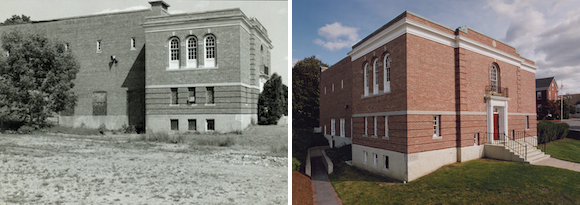History

Blackstone River Theatre (BRT), located across from the old Ann & Hope Mill on Broad Street in Cumberland, is the former site of the Unity Masonic Lodge. Built in 1928 and abandoned in 1987, the brick structure has been and continues to be renovated for use as a nonprofit cultural arts and community center. The Theatre also provides arts education and instruction through its Heritage Arts Studio initiative.
In 1996, a vision for bringing the arts to residents of the Blackstone Valley was born. The challenge was to turn an abandoned, heavily-vandalized building into the new home of Blackstone River Theatre. Since July, 1996, when BRT took over the former Unity Masonic Lodge at 549 Broad Street, Cumberland, it has been painstakingly transformed from a building targeted for demolition into what is now one of the brightest spots in the Valley. The renovation work was spearheaded by Russell Gusetti and Bob Drouin of the RI-based music ensemble Pendragon who coordinated a small but dedicated group of volunteers with financial support provided by the John H. Chafee Blackstone River Valley National Heritage Corridor Commission, the Town of Cumberland, and several local businesses.
Enthusiastic support of BRT efforts by the Town of Cumberland is evidenced by a new 15-year lease from the Town (as owner of the building) signed in 2019. Volunteer efforts since mid-1996 now total more than 54,000 hours and have averaged more than 2000 volunteer hours per year since reopening.
After an initial four-year, all-volunteer renovation effort, BRT has been open for performances since September, 2000. Renovations and improvements are ongoing. Office/meeting and classroom spaces were added on the 3rd level in 2018 thanks to a grant from The Champlin Foundation. The first Phase of a major capital improvements plan began in Spring 2016 with the historic repair and renovation of the building’s windows and installation of fire-rated window treatments in the main hall. Installation of a dual HVAC system in the building’s mezzanine and 2nd floor office areas took place in early 2017. Support for this project was made possible by a grant from The Champlin Foundation and also by a State Cultural Facilities Grant awarded by the Rhode Island State Council on the Arts.
